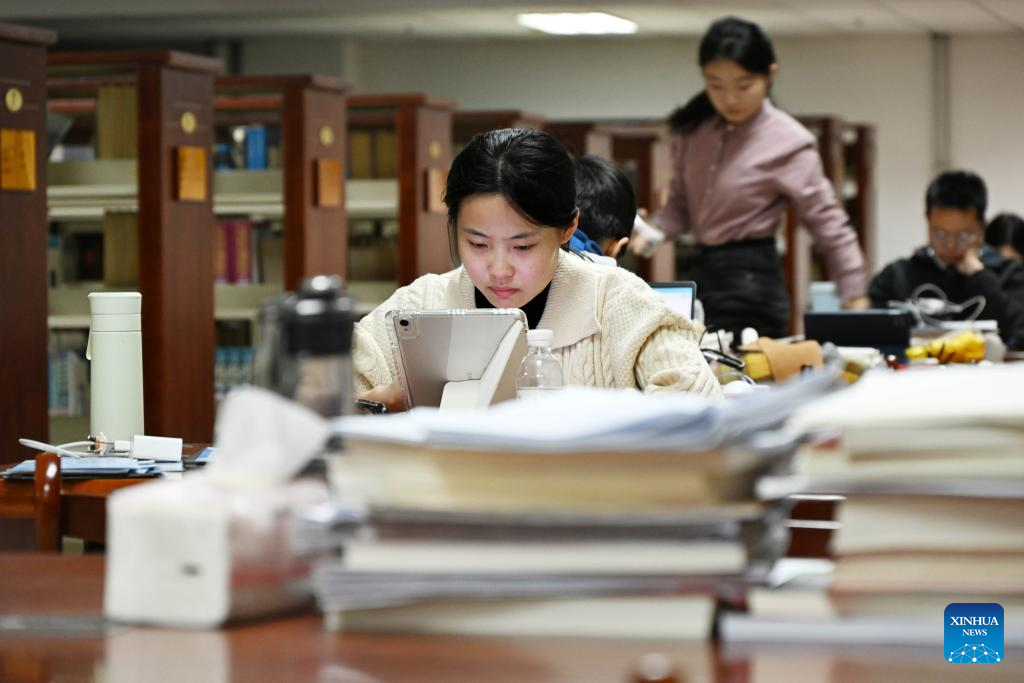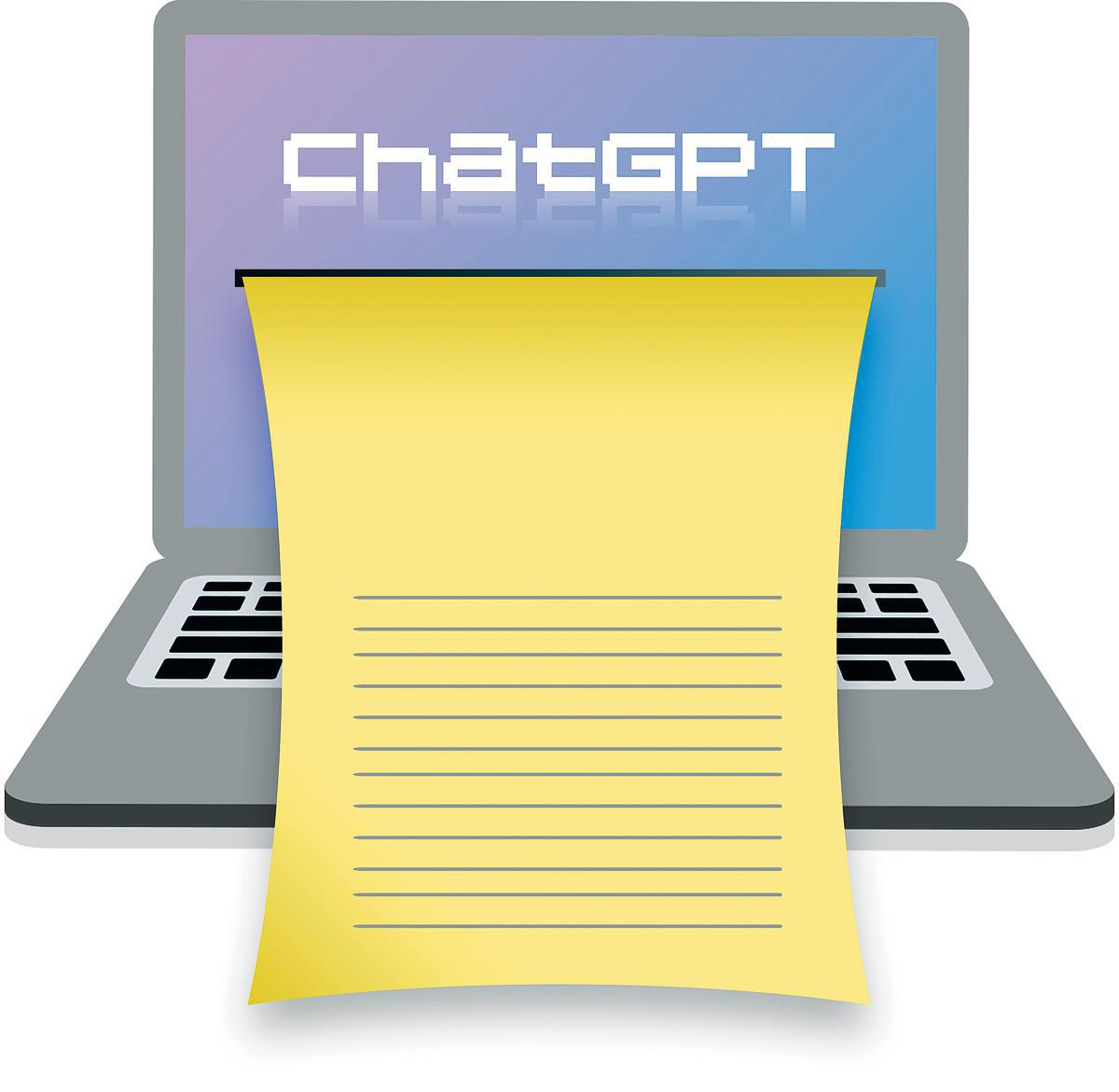Teachers want technology to be used to increase efficiency without threatening originality

As university students around China busily prepared for their final exams in January before the semester ended, artificial intelligence played the role of a learning buddy more frequently than ever before.
A law major at a university in Shanghai said that he completely relied on AI to produce Power-Point slides, with which he made presentations that allowed him to pass the assessment for the subject of intellectual property law.
"The AI software can turn in a PPT document in just five minutes, and adjust the page style and aesthetics according to my orders. The presentation went smoothly and nobody realized that I had turned to AI for help," said the student, who wanted to be referred to as Lin.
The 22-year-old said that he and his classmates are adept at using common generative AI tools developed by both foreign and domestic companies, and know which tool works best for a particular task. The overall user experience is not bad, he said.
Like Lin, Chinese millennials born and raised in the internet age are among the major users of AI. For some, the technology has become an indispensable assistant in everyday life and studies. Some even use AI to write papers and theses.
ALSO READ: Senior WEF official: China contributes to AI global governance
Taking note of this trend and to establish guidelines for responsible AI use, Fudan University in Shanghai introduced a set of regulations in late November to limit AI use in undergraduate thesis writing.
It was the first time that an institution of higher education in China had issued detailed, practical regulations on the use of AI. Involving six prohibitions and penalties, such as revoking degrees for severe violations, the restrictions are believed to be the first of their kind in the world on AI use in academic settings.
"The use of particular AI functions banned for students writing graduation theses reflect the specific abilities we focus on developing in youngsters, and what kind of people we ultimately aim to cultivate," said the head of the academic affairs division at Fudan University, who did not wish to be named.

"At the undergraduate level, the university wants to assess the students' abilities to innovate, think critically, express themselves properly and write. These are all tested through the thesis, and we don't plan to compromise on shaping such abilities in this era of technological explosions," he said.
Several university teachers said that amid the irreversible march of technology, schools will guide students on proper use of AI tools to increase learning efficiency and broaden horizons while avoiding AI overuse and misuse, which threatens academic integrity.
"The new era of accelerated technological developments has placed new requirements on university education and teachers. Teaching should be more focused on human abilities that cannot be replaced by machines. Also, the method of university education to evaluate students' literacy and capabilities should be updated," said Shen Yang, an associate professor at Shanghai Jiao Tong University's School of International and Public Affairs.
Fudan University's regulations state that use of AI tools are banned for designing research plans, building algorithms and model frameworks, devising thesis structure, and summarizing conclusions.
READ MORE: Behavioral red lines highlighted for AI safety
"We hope AI will empower young people, rather than replace them in doing work with original innovation," said the head of the academic affairs division at Fudan University.
Fudan's regulations also stipulated that AI cannot be used to polish up language and for translations.
"Smooth writing and clear logic are the key capabilities we hope to see in students across all majors at the undergraduate level. These are closely related to their ability to think creatively," said the university representative.
If undergraduate students do not lay an emphasis on the ability to express themselves and write, they may miss the best opportunity to build such ability, as studies in the following phase may focus on other abilities, for example, the ability to carry out scientific research independently, he said.
According to the document, conditions where AI can be used include helping to retrieve and review literature, make charts and figures based on already existing ones, and collate references — all aimed at improving efficiency. This is only allowed with the supervisor's consent and when AI-generated content does not affect evaluation of student's innovating capabilities.
Fudan University said that each department can formulate more specific regulations on AI use in assignments according to its own characteristics.
Prior to Fudan University, nearly 10 tertiary education institutions in the country voiced their intentions of discouraging students from misusing AI in academics, especially in writing graduation thesis.
The Tianjin University of Science and Technology, for example, published a document in May, stipulating that if AI-generated content accounting for 40 percent or more in an undergraduate student's graduation thesis is detected, the university will issue a warning and require rectification.
In July, Beijing Normal University's School of Journalism and Communication and Shanghai-based East China Normal University's School of Communication jointly released a user guide for students regarding the use of generative AI. It made clear that when students use such tools for assignments, they must mark the AI-generated content in red, and the content cannot exceed 20 percent of the full text.
Overuse and misuse
The concerns of these universities are not unfounded. Several domestic surveys have showed that many college students use AI tools in the learning process and while working on assignments and papers, and the proportion of improper use is not low.
A study last year revealed that the proportions of undergraduate students who admitted to using generative AI to assist learning "sometimes", "often", and "always" were 33 percent, 40 percent, and 12 percent, respectively. Roughly one-third respondents said they directly copied AI-generated content.
Undergraduates use AI tools in many aspects, including data and literature search, data analysis, language editing, translation, and thesis writing, according to the research. AI tools are mostly used when they write papers and work on group assignments for courses.
The research surveyed more than 3,000 undergraduates from 13 universities all over the country, and was conducted by researchers from Nanjing Agricultural University and Zhejiang University.
Lin admitted that he had used AI to write papers, and this is common practice among his peers. Such tools significantly improved efficiency in producing papers. By using an AI tool, Lin only needed to enter a few prompts in the dialog box, and it searched for literature related to the research direction and extracted the core content of the article in batches.
"It used to take at least half an hour to read a paper. Now I can obtain the outline of dozens of papers in just a few minutes," he said.
When he could not find an appropriate introduction to his paper, all he needed was another few prompts in the dialog box to drive the AI tool to generate dozens of titles. After deciding the title, the tool created the framework, abstract, and other parts of the paper upon request.
READ MORE: AI dominant in funding investments
AI-created school assignments, especially those involving design and article writing, are now available on online shopping platforms. Some AI tools provide free AI rate detection service for students, and then provide paid rewriting service to reduce the rate.
Liang Ziyin, a graduate student majoring in English at Shanghai Jiao Tong University, said that she uses AI tools to correct grammar mistakes in English writing, and turns to AI for help when she fails to find the right word while doing translations. But she has never used generative AI in a school assignment that really matters.
"The content generated by AI tools is in a paradigm in terms of sentence length and language uniformity, which is quite obvious. And we certainly resist this kind of behavior of letting AI do creative work for us, and assignment grading based on such work undermines fairness," she said.
According to Liang, content generated by AI is often exaggerated and fabricated. She once requested an AI tool to provide the names of the most well-known books about subtitle translation, and some of them were fabricated. There were other times when she requested AI to look for certain types of articles on news websites overseas, there would be fake articles, and the links to the articles were invalid.
"I also tried AI tools to improve the language and the richness of the text when writing in English, but felt that the content is exaggerated as AI would often use such words as 'significant', 'milestone', and 'groundbreaking'," she said.
However, AI has its uses. Liang is now interning at a senior middle school as an English teacher. She uses AI to set test papers for students regularly.
For example, she said, 10 new words are contained in a chapter and need to be included in a test. She would use AI to come up with a paragraph containing the 10 words, but dig out these words and let students choose words to fill in the blanks.
"Machines can think of a variety of themes in an instant. As teachers have to change the tricks to come up with new test papers frequently, it'll be hard if we totally rely on ourselves to think of new questions," Liang said.
New requirements
Many students and teachers mentioned that AI imposes new requirements on teaching, teachers and the students' ability of using such smart tools.
Several teachers said that there does not exist a common, authoritative detection method to determine how much of an assignment submitted by a student is AI generated. This requires teachers' ability of understanding and using AI.
Some teachers said they are increasing in-class, hands-on assignments while reducing after-class ones, especially those that involve writing, so that students are forced to better participate in the learning process.
A consensus among teachers is that a complete ban on students' use of AI is obviously not possible or necessary. They believe that coexisting with AI in a scientific way shall be the trend of education for the future.
Sun Haiqin, who teaches conference interpreting at Shanghai International Studies University's Graduate Institute of Interpretation and Translation, said that as AI is capable of doing basic translations, the focus of learning for high-level interpreting talent shall shift to post-editing of drafts provided by AI.
"Post-editing is about finding AI's mistakes in expressions and logic, and the ability to correct them. Students are required to be able to do translation — and do better than machines. They need to input human ideas to make their translation work irreplaceable. So in the age of AI, workload is reduced, but work becomes more demanding," said Sun, who encourages her students to make good use of AI in different phases of an interpreting job.
The ability to interact with machines is another key competitiveness in the AI era, Sun said. "Users who have a way to write the most appropriate prompt words will obtain the best answer," she said.
In the smart age, humans shall be more dedicated to work that is irreplaceable by machines, such as communication between people.
"Translation is a mutual learning process between civilizations, involving transnational, cross-cultural communication. Translation should reflect humanistic feelings and patriotic sentiments with emotional input from humans," said Sun.
"However, the use of AI is essential for all walks of life. It is important to understand it, use it well, and outperform it," she said.


